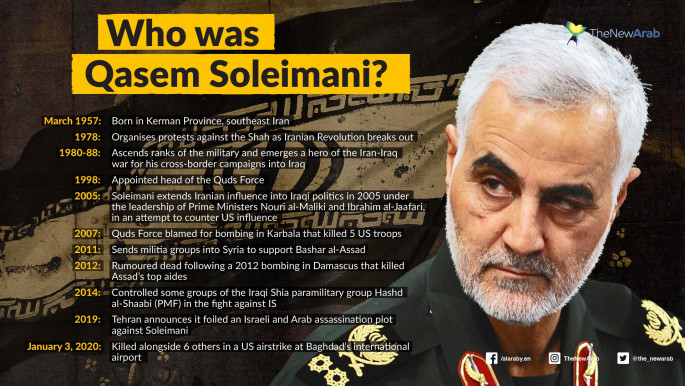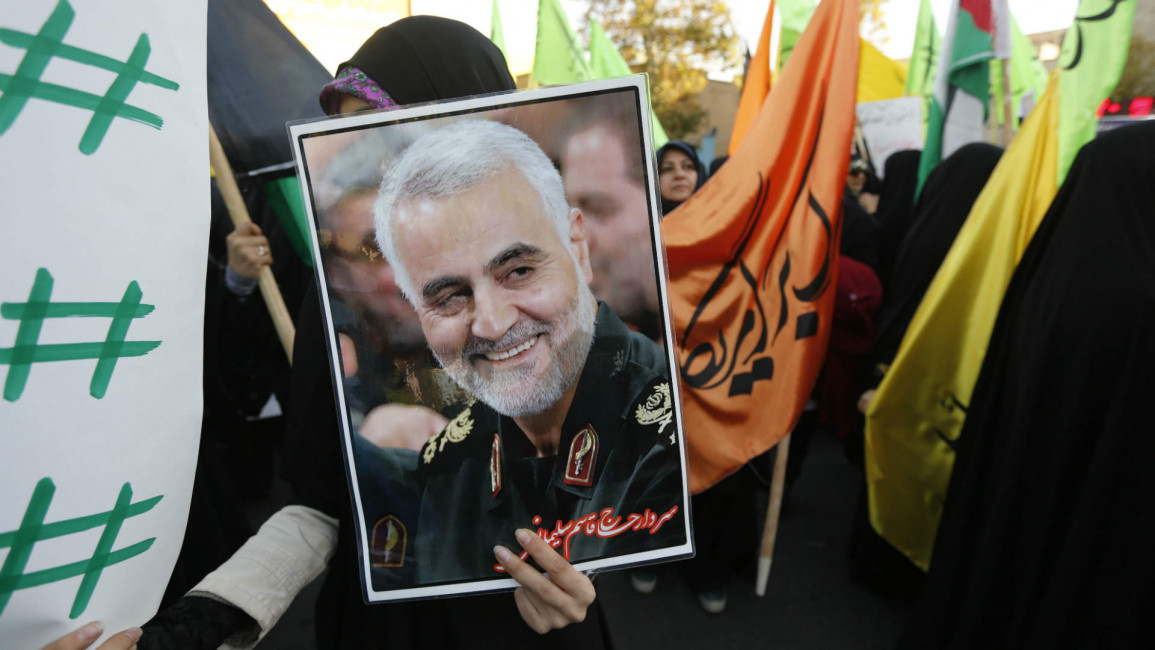Who was Qasem Soleimani, the powerful commander of Iran's elite Quds force?
With supreme leader Ayatollah Ali Khamenei vowing to take "severe revenge" and President Hassan Rouhani warning of a "devastating war", the dramatic repercussions of Soleimani's killing cannot be underestimated.
But who was Qasem Soleimani, and why did the Trump administration take such a risk to kill him?
The 62-year-old commander of the elite Quds Force of the Iranian military was considered the second most powerful person in Iran, with only supreme leader Khamenei wielding more influence than him.
Thought to have masterminded Iranian operations across Syria, Lebanon, Iraq, the Gulf and more, Soleimani's actions shaped the entire region in a way that granted him more power than even the Prime Minister, Hassan Rouhani, and spread Iranian influence further afield than ever before.
Rise to power
Despite a humble upbringing in a poor village in Iran's Kerman province, Solemani swiftly ascended the ranks of the military, not only surviving the horror of Iran's long war with Iraq in the 1980s, but emerging as a military hero for the campaigns he led inside Iraqi territory.
Twitter Post
|
Taking control of the Revolutionary Guards' Quds Force, responsible for the Islamic Republic's overseas campaigns, in 1998, Soleimani kept a low profile as he worked to build up Iran's ties with Hezbollah in Lebanon, Assad in Syria, and Shia militia groups in Iraq.
An early follower of Khamenei, the pair grew so close that the Supreme Leader officiated Soleimani's daughter's wedding.
The general's popularity and mystique grew following the 2003 US invasion of Iraq, as American officials called for his killing.
A decade and a half later, Soleimani had become Iran's most recognisable battlefield commander, ignoring calls to enter politics but wielding as much power, if not more, than its civilian leadership.
US forces blame the Quds Force for a 2007 attack at the height of the sectarian civil war in the Iraqi city of Karbala that killed five American troops, as well as for training and supplying the bomb makers.
Soleimani was therefore by all means no recent target of the US and its allies, surviving numerous assassination attempts led by Western, Israeli and Arab agencies over the past 20 years.
The secretive commander was rumoured dead several times, including after a 2006 airplane crash that killed other military officials in northwestern Iran and a 2012 bombing in Damascus that killed top aides of Bashar al-Assad. More recently in November 2015, rumours circulated that Soleimani had been killed or seriously wounded leading forces loyal to Assad as they fought around Syria's Aleppo.
The US and the United Nations put Soleimani on sanctions lists in 2007, though his campaigns continued. In 2011, Soleimani was named as a defendant in an outlandish Quds Force plot to allegedly hire a purported Mexican drug cartel assassin to kill a Saudi diplomat.
Campaigns in Syria and Iraq
Intent on countering US influence in Iraq, Soleimani turned his attention to Baghdad politics in 2005, as the government was re-established.
The general was able to extend his influence to the former Prime Ministers Ibrahim al-Jaafari and Nouri al-Maliki, with a recent leak of Iranian intelligence cables showing the extreme extent of Iran's meddling.
In the same period, the Iranian proxy called the Badr Organisation, a Shia political party and paramilitary force, was integrated into the state after the group took control of the interior and transport ministries.
However Soleimani's greatest notoriety arose from the Syrian civil war and the Quds Force's attacks against IS and other groups opposing Assad's rule.
Soleimani sent militia groups into Syria in 2011, when Assad's rule looked close to collapse, and was himself sent into Syria several times for battle, leading several ground victories for Iraqi forces where Soleimani was photographed never wearing a flak jacket.
Some wings of Iraq's Shia paramilitary Hashd al-Shaabi force came under Quds control. Hashd, also known as the PMF, led brutal campaigns in IS strongholds known to have massacred Sunni civilians and left behind a trail of mass graves.
Soleimani's campaigns in support of Assad were known for their brutality, having had a hand in the siege of Aleppo, which killed thousands of civilians trapped in the city, as well as the blockading of the towns Madaya, Qusayr and Zabadani where many starved to death.
Twitter Post
|
In 2015, Soleimani made a landmark visit to Moscow, to help plan the Russian military intervention that reshaped the Syrian war as well as forging a new Iranian-Russian alliance in support of Assad.
Tensions with Trump
Iranian officials had vowed to take revenge after months of mounting tensions between Iran and the US following Trump's pull-out of Tehran's nuclear deal with major world powers.
In recent years, Soleimani has also upped his public profile, appearing frequently alongside Ayatollah Khamenei.
Soleimani's continued activities across the region made him a repeated target of the US Treasury, sanctioning him over the Quds Force's support for Lebanon's Hezbollah and other armed groups, his part in Syria's crackdown against protesters and his alleged role in an assassination plot against the Saudi ambassador to the US.
Soleimani was also unafraid to challenge Trump directly as the tensions between the two countries flared.
"I'm telling you Mr. Trump the gambler, I'm telling you, know that we are close to you in that place you don't think we are," Solemani said in a video published in 2018.
"You will start the war but we will end it," he said, dressed in a checkered keffiyah worn over his military uniform.
"Trump through his gamble has dragged the US into the most dangerous situation in the region," Hessameddin Ashena, an adviser to Iran's President Hassan Rouhani, wrote on the social media app Telegram.
"Whoever put his foot beyond the red line should be ready to face its consequences."
Agencies contributed to this report.


